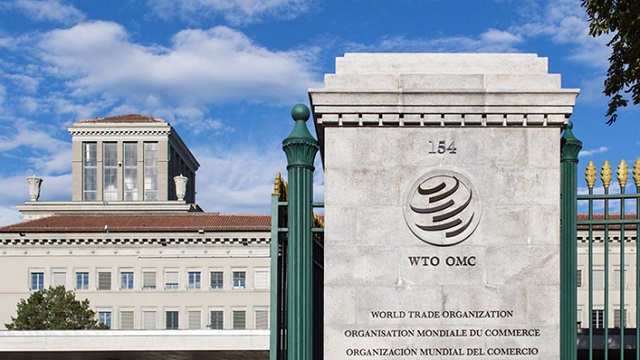Se establece un grupo especial de solución de diferencias para examinar determinadas bonificaciones fiscales en virtud de la Ley de Reducción de la Inflación de los Estados Unidos
La OMC acordó examinar bonificaciones fiscales concedidas en virtud de la Ley de Reducción de la Inflación de los Estados Unidos.

Foto tomada de https://www.wto.org/indexsp/
En su reunión del 23 de septiembre, el Órgano de Solución de Diferencias (OSD) acordó establecer, a petición de China, un grupo especial de solución de diferencias encargado de examinar la compatibilidad con las normas de la OMC de determinadas bonificaciones fiscales concedidas en virtud de la Ley de Reducción de la Inflación de los Estados Unidos.
DS623: United States — Certain Tax Credits Under the Inflation Reduction Act
China submitted its second request to establish a panel to determine whether certain tax credits under the United States Inflation Reduction Act (IRA) are in line with WTO rules. The United States said it was not in a position to agree to China’s first request in July, justifying its actions as necessary to combat climate change. China stated that the IRA’s subsidies favour US goods over imports, violating WTO rules prohibiting such discrimination.
The United States expressed disappointment over China’s decision to pursue a panel request and reiterated that the IRA is its most significant step toward clean energy, aimed at ensuring secure and sustainable supply chains for a global clean energy future.
The DSB agreed to the establishment of the panel. Argentina, Australia, Brazil, Canada, Colombia, the European Union, Indonesia, Israel, Japan, Korea, Norway, the Russian Federation, Singapore, Switzerland, Thailand, Türkiye, the United Kingdom and Venezuela reserved their third party rights to participate in the panel proceedings.
DS597: United States – Origin Marking Requirement (Hong Kong, China)
For the 12th time, the United States raised the matter of the panel ruling in DS597 at a DSB meeting. The US said it was raising the matter again as a result of recent developments in Hong Kong, China regarding free speech and human rights. The US referred back to its previous statements regarding its position on essential security and its reasons for placing this item on the DSB agenda.
Hong Kong, China criticized the US for once again raising this matter at the DSB. It referred to previous WTO panels that dismissed US claims that invoking national security in defense of a trade-restrictive measure is entirely self-judging. Any objections should be heard by the WTO’s Appellate Body, which remains blocked due to the US refusal to allow appointment of new Appellate Body members, said Hong Kong, China.
China reiterated its firm belief that a restored appeal mechanism is the proper place to address claims of panel error made by the US and rejected in the strongest terms what it said was US interference in the internal affairs of another WTO member.
Appellate Body appointments
Speaking on behalf of 130 members, Colombia introduced for the 79th time the group’s proposal to start the selection processes for filling vacancies on the Appellate Body. The extensive number of members submitting the proposal reflects a common interest in the functioning of the Appellate Body and, more generally, in the functioning of the WTO’s dispute settlement system, Colombia said.
The United States repeated that it does not support the proposed decision to commence the appointment of Appellate Body members as its longstanding concerns with WTO dispute settlement remain unaddressed.
Twenty members then took the floor to comment. Many of these members referred to their previous statements made on this matter at earlier DSB meetings and underlined the urgent need to meet the mandates set out at the 12th and 13th Ministerial Conferences in 2022 and early 2024 respectively to conduct discussions with the view to having a fully and well-functioning dispute settlement system accessible to all members by 2024.
Several members welcomed the progress being made in the formal dispute settlement reform process now underway and the need to accelerate discussions to achieve the 2024 goal.
Colombia, speaking on behalf of the 130 members, said it regretted that for the 79th occasion members have not been able to launch the selection processes. Ongoing conversations about reform of the dispute settlement system should not prevent the Appellate Body from continuing to operate fully, and members shall comply with their obligation under the DSU to fill the vacancies as they arise, Colombia said for the group.
The DSB chair, Ambassador Saqer Abdullah Almoqbel (Saudi Arabia), concluded by expressing his full support for the facilitator in the dispute settlement reform discussions, Ambassador Usha Dwarka-Canabady of Mauritius, in her efforts towards achieving a positive outcome within the mandated time frame.
OTHER BUSINESS
Surveillance of implementation
The United States presented status reports with regard to DS184, «US — Anti-Dumping Measures on Certain Hot-Rolled Steel Products from Japan», DS160, «United States — Section 110(5) of US Copyright Act», DS464, «United States — Anti-Dumping and Countervailing Measures on Large Residential Washers from Korea», and DS471, «United States — Certain Methodologies and their Application to Anti-Dumping Proceedings Involving China.»
The European Union presented a status report with regard to DS291, «EC — Measures Affecting the Approval and Marketing of Biotech Products.»
Indonesia presented its status reports in DS477 and DS478, «Indonesia — Importation of Horticultural Products, Animals and Animal Products.»















